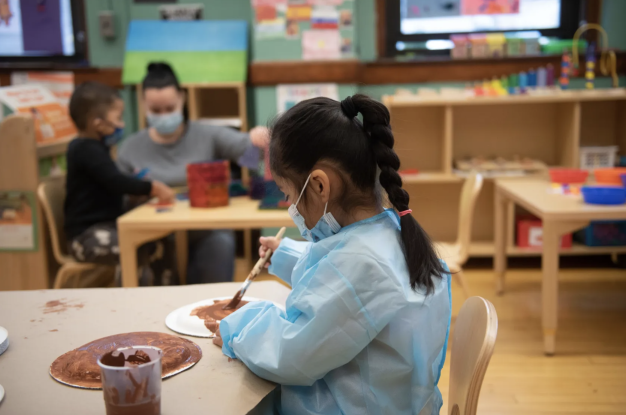
Years after pandemic closures, we’re seeing their effects inside our schools
Since school buildings reopened after COVID closures, I’ve heard teachers say, again and again, that the older elementary children in their classrooms are just not the same.
I lead a small network of schools, and many of our current fourth graders remain dependent on adults’ opinions and find it hard to move from one problem to the next without reassurance. Our fifth graders can solve a basic math problem but often struggle to explain how to answer a word problem. Across fourth, fifth, and sixth grades, we’re seeing students have trouble with sharing, taking turns, and working with others — symptoms of the developmental milestones many children missed in recent years.
What exactly did they miss? As an early childhood specialist who taught kindergarten through second grade for 12 years, I remember watching the progression of cognitive and social development throughout the early elementary school years, says early childhood specialist Christine Ferris.
At the beginning of kindergarten, my students would bunch together, crowding at the door, massing around me, all asking questions or wanting to show me the boo-boo on their finger. Sometimes, it seemed like they didn’t even notice that they weren’t the only child in the room. They had to learn how to exist in a large group.
‘The playground was a magical place’
Once they learned how to manage in a group, we began the work on interpersonal relationships, like how to share, respond to a question, and show empathy. Kindergarteners frequently respond to questions with unrelated statements of fact that are of interest to them. For example, if I were to ask the class, “What do you notice about the main character in this story?” they might say, “My uncle is getting a puppy this weekend” or “I had pancakes for breakfast.” All year, they progressed toward understanding that their perspective wasn’t the only view of the world.
My first graders did understand that there were other people and perspectives. This made them good at working with partners. They wanted to please the adults by following the rules at school, but their good intentions could fall by the wayside if they wanted something badly enough. Because they knew the rules but could not help but break them sometimes, first graders would sometimes lie. “No, I didn’t do it!” was a frequent refrain.
For first graders, the playground was a magical place full of fairies, knights, and superheroes, because all you needed was the right stick or flower or a little scarf tied around your neck to transform. These types of imaginary games are part of developing complex representational thought, which helps our minds visualize characters in novels, understand the symbols that stand in for equations in algebra, and think through a variety of outcomes so we can make strategic life decisions.
‘There is so much study about the impact it had’
My second graders were terrified of making mistakes and froze up when what they were trying to draw didn’t keep up with their underdeveloped fine motor skills. They wanted a lot of reassurance. They wanted to be able to do the things the big kids did, but they weren’t quite sure how. They thrived on routine and working together to tackle complicated tasks, whether it was creating a class newspaper or garden, or running the school post office. Second grade was always my favourite because of that incredible industriousness.
Isolated at home during the pandemic, early elementary school students missed out on complex, make-believe play and had grown out of it by the time we all got back. I worry that this might be getting in the way of tasks that require symbolic reasoning. We see, for example, that our fifth graders can answer a factual question about something they’ve read but struggle to make reasonable inferences.
Many grades have had to go back a few years to teach students some of the more basic concepts. We have adopted a social-emotional curriculum that teaches children to recognise and name their feelings, how to calm themselves down, and how to explain to another person the impact of their actions on them.
There is so much to study about the impact of those two COVID years on learning that I have no doubt it will be the subject of Ph.D. dissertations for decades. But in the meantime, schools and educators are tasked with catching students up on what they missed. The New York Times recently published an article with a tool where you could type in your local school district and see how far behind it was in math and reading compared to the pre-pandemic years.
I believe in assessments. It is crucial to understand what your students know and still need to learn in order to teach them well. But it’s also important to remember that there is much more to child development than learning multiplication tables or the fundamentals of reading. Even as we gauge academic progress and gaps, we must acknowledge the other skills that so many of our students need to catch up on as well.
In our rush as adults to be over this pandemic, let’s not deprive our students of the time they need to explore who they are in relation to their peers. In turn, hard-working teachers and school leaders need grace as they try to figure out how to give every kid what they need and deserve at this unprecedented moment.
Christine Ferris has been the Executive Director of Highline Academy Charter Schools since 2016. She founded and led Our Community School, a K-8 charter school in Los Angeles from 2005 to 2013. She is a writer of personal essays and a memoir about her experience leading Our Community School.
Chalkbeat is a nonprofit news site covering educational change in public schools.
This story was originally published by Chalkbeat. Sign up for their newsletters at ckbe.at/newsletters




